Ideas
Why Bhamashah Swasthya Bima Yojana Should Survive in Rajasthan – With Some Changes
Sumati Mehrishi
Apr 17, 2018, 07:14 AM | Updated 07:14 AM IST
Save & read from anywhere!
Bookmark stories for easy access on any device or the Swarajya app.
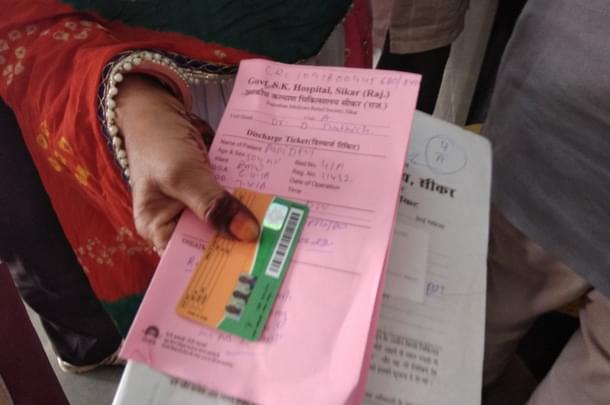
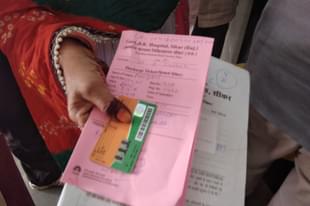
Stitches on her lower abdomen have hemmed her joy momentarily. A new mother is being discharged from Janana Hospital, a government-run healthcare facility for women in Chandpole, Jaipur. She takes small steps, tucks her lips and purses her pain and covers her abdomen with a loose end of her traditional garment. Behind her, a family member holds her newborn twins – a boy and a girl. She gave birth to twins after undergoing an "operation".
After a couple of rituals, they are ready to move to a village near Ringas, a three-hour drive from Jaipur. Elders accompanying the new mother lovingly call her Anju, and want to ensure that her Bhamashah Card is working, to help her meet the future needs as a mother. "Although we didn't need it this time, and should not, even in future, we should keep it handy when travelling for medical treatment," said her relative. As if to register her presence, the girl child begins to cry.
Between birth and a struggle for life against diseases, from the Chandpole hospital to the outer open area of Sawai Man Singh (SMS) Hospital in Jaipur, patients and their kin weigh medical care options before them.
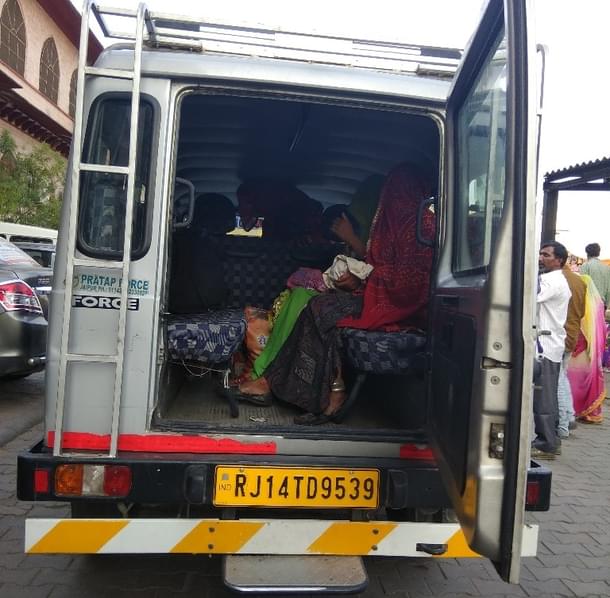
Anjum Bano fans a bowl of khichdi (a preparation of boiled rice and lentils) with sheets of medical prescription and admission documents to keep away flies. Her sister coaxes her to begin eating. They have to return to the patient's bed a few minutes later. Bano's appetite is dwindling and so is her hope. She refuses to eat. "My daughter is suffering from blood cancer," she said. "She is 14 and admitted to the hospital for treatment, which includes chemotherapy. I cannot see her in pain. She has been pleading to be taken back home. Though I was able to bring her to this renowned government hospital for treatment, I don't know what to do when she is discharged from here," said Bano.
According to Bano, her daughter's ongoing treatment would have been unthinkable without the Bhamashah Card (for BSBY). "The process is easy to follow. The person at the Bhamashah counter looks at my papers and prescription and grants permission for medicines, treatment and billing the expenditure against the card. This facility has taken away some stress," she added.
Advantage Rajasthan
For women in Rajasthan, the Bhamashah Card serves as a single platform offering a spectrum of services, and is an important document to avail the scholarship for the girl child, from her birth, under Mukhyamantri Rajshri Yojana announced by Chief Minister Vasundhara Raje Scindia in 2016. It also becomes the key to availing medical care for 1,715 diseases listed under the Bhamashah Swasthya Bima Yojana (BSBY). A senior officer associated with Bhamashah Yojana said, "BSBY is one of the many services used under the single platform of Bhamashah Yojana. Some services have been used more than others."
How does the card work for BSBY? The officer adds, "a Bhamashah Card holder eligible under the National Food Security Act (NSFA) is covered under BSBY. If she is not eligible under NSFA, the name will not appear under BSBY on the portal."
BSBY, launched in December 2015 by Rajasthan government, with the aim of providing cashless healthcare services to poor, ensures a cover, under the NSFA, of up to Rs 3 lakh for people below and above poverty line. The scheme provides an annual cover of Rs 30,000 for not so critical illnesses and increases it to Rs 3 lakh for critical illness from the list of diseases specified under the yojana. These packages listed under BSBY for specific diseases fall under secondary and tertiary (more specialised and advanced) categories. An estimated 4.5 crore people are covered under this insurance scheme.
Bhamashah Yojana provides convenience, aid and hope, with BSBY tucked in its spectrum. Rajasthan Health Minister Kali Charan Saraf said: "Bhamashah Swasthya Bima Yojana ko janata ne achche se accept kiya aur Rajasthan ki two-third janata is se labanvit ho rahi hai. Yojana 2015 mein launch honaey ke baad, picchle dhai-teen saal mein lagbagh 2,200,000 log is se labhanvit hue hain. Aur kam se kam Rs 1,200 crore humne ismein beemamuk kiya hai (people of Rajasthan have accepted BSBY. Since its launch, 22 lakh people have benefitted from it and we have pumped in at least an estimated Rs 1,200 crore in the insurance plan)."
In Jaipur, where people converge for treatment from towns in Rajasthan, Uttar Pradesh and other neighbouring states are aware of Bhamashah Card's value in the current healthcare narrative within the state.
Some exercise choice in unique ways. In Sikar, at S K Hospital, Jaitun Bano stands in a queue for her sister-in-law, Pappi Bano, holding her Bhamashah Card, admission and prescription papers in hands covered in henna. "She was admitted for sugar-related complications and is getting discharged. She insisted on getting treated in Sikar instead of Jaipur, where she comes from." Why? Pappi Bano replies, "medicines prescribed here suit me".
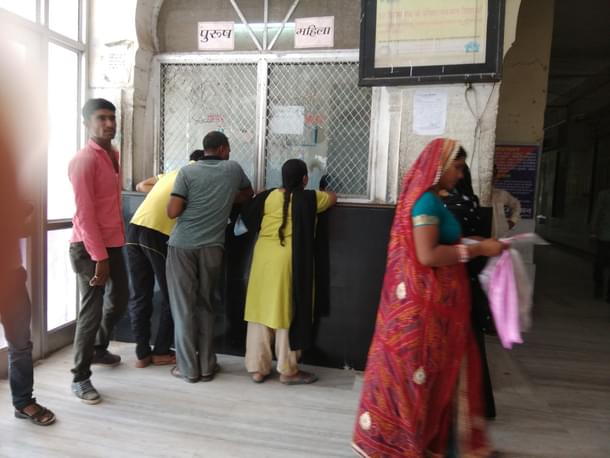
Others go with the trust factor. Saroj, a young mother travelling to Sikar to visit her kids at a boarding school, said, "for people like us, mostly farmers in Rajasthan, the trust in government hospitals is intact. Choosing a government hospital would be easier than scurrying through the list of private hospitals falling under the right treatment package that suits them under BSBY. Who would keep shuffling options?"
Crucial In Crisis
The absence of Bhamashah Card pinches some people hard in the time of medical crisis. Some are aware of their eligibility under NFSA and regret not initiating timely action towards acquiring the card. Then, there are others who regret lack of awareness. Yet there are others, who got the card made but forget to carry it at the time of urgent need of medical care – for themselves or kin whose names are mentioned on it.
There is an uneasy silence at one of the circular sheds meant for patients’ kin. Two young men, with their backs turned at each other, sit silently. One of the two, Sonu Singh, who works as a labourer engaged in shuttering work at a building construction site, visibly angry, wipes his tears. "We have come from Alwar. My sister had been complaining of some issue in her stomach. Doctors at a private hospital in Alwar told us that she had to be operated upon. We had thought the problem would be over. It seems that our ordeal has just begun. Here, at Sawai Man Singh Hospital, doctors, after conducting the essential investigations, have told us that her kidneys are failing."
An elderly man, seated on the bench between these two men, begins to have his dinner – a short and necessary distraction from the bad news imploding their lives. Singh added, "doctors at Sawai Man Singh Hospital tell us that carelessness during operation at the private hospital in Alwar led to these complications. I work in a building construction team. We can barely afford meals. How do we save her?"
The story behind his anger unfolds. Tears return to his swollen eyes. "To make things worse, my sister has no medical insurance to fall back on. Her husband's family did not even care to get her a Bhamashah Card. We had been asking them to provide the necessary documents since the launch of BSBY last year. That would have taken care of her needs to some extent, at least," he added.
The concept of reduction of out of pocket expenditure in the event of an ailment or procedure that requires up to Rs 3 lakh per year has been communicated well by the government. The minister added, "yadi logon ko pata nahin hota to baees lakh logon ko iska faida nahin milta. Koi ek aadhaa vyakti hoga, kyonki baees lakh logon ne is se faida liya hai aur inka ilaaj nishulk hua hai. Pata nahin hota to itne log labhanvit thhoda hee hotaey do-dhai saal mein (had people not been aware of the scheme and its benefits, it would not have been used by so many people)."
An Hour Too Short
BSBY, visibly, has been accepted as a "helpful scheme". However, there are signs suggesting that the process could become simpler, and communication on the yojana, better, wider and more effective. Critics have rounded off the yojana's response to patients as something, vaguely, on the lines of "exclusion". According to people serving at trauma and emergency desks, the problem lies in the use of BSBY during medical emergencies. Here, many times, availability of signed documents and the Bhamashah Card ends up draining crucial time and energy.
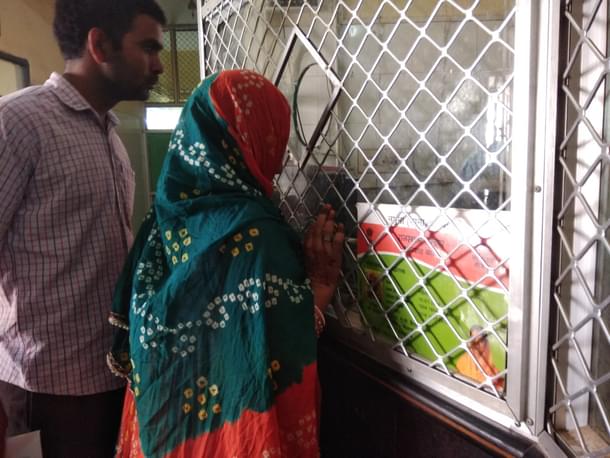
How? Dr Vikas Agarwal at S K Hospital, Sikar, explained, "the patient has to show the Bhamashah Card within an hour at the counter to avail the benefits under BSBY. They say, 'sir, card hai, lekin ghar pe reh gaya (we left our Bhamashah Card home).’ The patient is not able to get admission under BSBY – the good yojana meant for him. In such cases, a patient should get some relaxation. He should be given 24 hours to show the card."
People critical of the scheme have pointed towards "exclusion" of poor patients from private and government hospitals. Staff at government hospitals, differ. "There is no question of "excluding" or "returning" patients," said a worker at Janana Hospital, Chandpole, Jaipur.
However, many workers at Japiur government hospitals stress that the process, for this scheme to work better, should be made simpler and features leading to confusion, be watered down, at least in perception and communication to patients. "The basic motive of the yojana – to serve the poor and poorest of poor – hinges on the ease of using it. It is marked with hurdles, if not flaws. The one-hour window in the case of emergencies is definitely creating problems for patients. We have to go by the system. It sometimes becomes tough for us to tell the patients that they have to start the documentation process all over again. Some of them, naturally, lose patience," the worker at Chandpole hospital said.
Manoeuvring through a set of difficulties, dedicated hospital staff at government hospitals continue to address patients' queries and guide them on procedures falling under BSBY. They help patients by providing assistance in a polite manner. And when the patient returns to the window, for more queries, the tone becomes warmer and warmer.
At S K Hospital, Sikar, Ravi Mathur, a diligent worker at the emergency desk, leaves his chair and sits on loads of patience to address queries and stamp documents. An elderly patient returns to the window, complaining, her document is not stamped. He said, "arre, meri ma, ismein laaga to rakhi hai mohar. Kaunsi mohar lagaun ismein doctor ki bata tere liye? (it is stamped, dear mother)". Another stamp later, he said, "Go tell the doctor that it is stamped."
According to Mathur, things have become complicated owing to the one-hour stringent condition. He said, “earlier, the time window for completing the process related to the card for getting medical care for emergencies was 48 hours. Later, it got reduced to 24. If a patient came under BSBY, and forgot his card home, he could without wasting time and delaying treatment return in 48 (and later, 24 hours to complete the formalities) to show his card. Now, the window has got reduced to one hour. We have expressed our concerns about this and I hope things change on this front in this good scheme meant for the poor.”
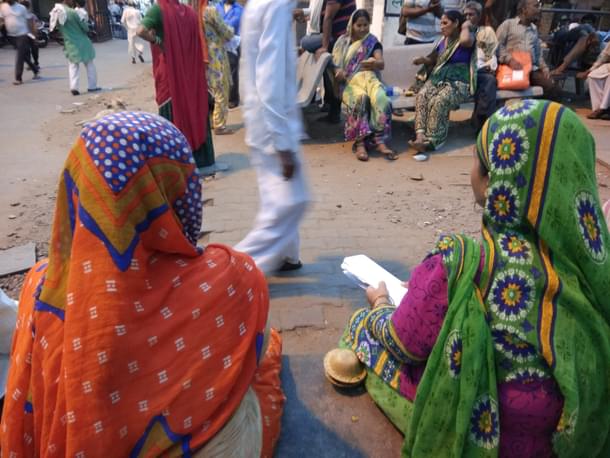
"The one-hour criteria in government and private hospitals is causing problems in the treatment of critical patients. Sometimes patients who come without attendants stand in the queue, get the admission slip, get examined by the doctor, get the package code written, return to my desk again with the papers and the card (when he is carrying it), trying to wrap it all in the given time window. At times, the entire back and forth takes more than an hour," said Mathur.
Emotions in such situations don't help either. "If we show the patient admitted after an hour's time on portal, queries would be raised by the insurance company," he added.
Some Extra Minutes
A patient's convenience is any diligent worker's priority. Mathur is just one of such workers attending to queries that fall under BSBY. Attendants of another patient approach his counter. "Where is the patient?" Mathur asked. "At the gate. He can't walk to the counter," the attendants say. "Take his picture on a cell phone if he is unable to move and return quickly," said Mathur.
In case of emergencies, there are annexures to ease the pressure, both, on the patients' kin/attendant and the workers. Communication relating to these annexures is a vital factor in the effective use of the card.
"If there is a critical case, say, of an accident or a heart attack, and the patient is not carrying the card at the time of admission, we use annexure one, an emergency certificate that is filled up by the doctor and later uploaded on the portal to take care of the patient's medical care. Then, in case a person's biometric identity is not getting uploaded (usually, it happens in case of people who undertake physical work in farming and labour which affects their fingerprints), we use annexure two. Then, there is annexure four, which is used in case a patient is unable to walk up to the emergency counter. In such cases, photos of the patient are taken on mobile phones – next to the bed or wherever they are in the hospital. Details on the annexures are later uploaded on the portal," Mathur said.
Uploading of details from these annexures, a separate process in itself, helps the patient and his kin. "Imagine the number of paripatra (annexure) entries at a government facility like Sawai Man Singh Hospital," a worker at another Jaipur hospital said.
On problems arising from the one-hour window criteria for showing Bhamashah Card, minister Saraf added, "whenever a scheme is launched, it lacks in some aspects. As soon as we notice the deficiencies, we work towards improving the scheme. If we are informed about deficiencies and there is scope for improvement, we shall work on it."
Fast Learners
Communication sharpens the use of technology. Sometimes, in case of BSBY, technical issues relating to the card, or insufficient understanding of BSBY eligibility dampens spirits at the wrong time. When technical issues relating to the card strike its holder, she has very little energy left to understand factors behind the glitches or her inability to use the card for BSBY. That’s when efficient officials swing into action. What are the frequent technical issues? "Some patients complain that they are not getting treatment at the hospital using the card," added a senior official associated with Bhamashah Yojana.
Why does that happen? "Sometimes, the software tells the worker that the card is not active. But some people who have the card are not covered under the National Food Security Act (NSFA). Their number won't appear on the system unless they are eligible under the NFSA. In such cases, the person simply assumes that the card is not active. Once he is eligible, his name will start appearing under BSBY. When people troubled by these problems come to the Bhamashah Yojana office, we help them by explaining the technical issues and solving the problem," he added.
Several patients or their kin are illiterate. Many times, they are not even able to name or explain the diseases their kin suffer from or have been admitted for or would be operated upon for.
Ram Prasad, a farmer from a village near Boondi, tries his best to narrate why he had to bring his sister to Sawai Man Singh Hospital. He said, "we are not sure what happened to her. She was alright until the morning and then, after performing some daily chores in the house, she fainted (he sticks his tongue out of his sunken and wrinkled cheeks to show how she fainted)."
Kajor, the patient's husband, tries to explain some numbers that would back her treatment. "We sell a quintal of produce for Rs 2,200 to Rs 2,300, which is enough to meet our daily needs and minor medical expenses. I am hoping she doesn't have to undergo an operation. My wife has a Bhamashah Card in her name but I am not sure how to use it for ailments. Maybe, someone from the hospital guides us after the treatment is over," he said.
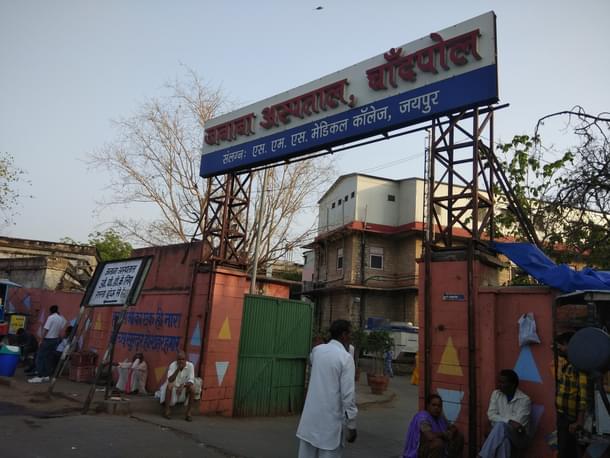
While such patients are helped by workers at the counters through simple and humble communication, many times, in dialects they understand. A worker at Chandpole's Janana Hospital said, "many patients have moved beyond the initial hiccups involving the issuing of Bhamashah Card after furnishing the required documents. They are learning to keep the cards and documents in place, under proper care. Problem arises when they have to negotiate choices – between no choice to a few, especially in case of private hospitals – for the care and package they need. Ironically, the yojana is of immense help to the poor when they choose to avail a package they need at a private hospital, not so much at government hospitals”.
What can be done to help such patients and their attendants when they come to private hospitals, where options are limited and benefits are more? Santokba Durlabhji Memorial Hospital’s Urology Department head Dr D N Kalla talks about the need to simplify the process and the changes it needs. "We can cut it (the process) short. The card has been given. If a person needs a surgery, then he can come, get operated and go back. Every time we have to send him back to the office. He has to get the permission. It unnecessarily takes three to four days. In emergency, too, the same thing applies. Only old cases are getting the benefit out of it.
What should be done to improve this situation? "Humein usaey treat toh karna hee hai (we have to treat him). The whole admission process unnecessarily takes a few days. Us se treatment delay ho jata hai (the treatment gets delayed). The process should be shortened, the patient should be able to go for the surgery and get admitted easily by showing the card. Right now, the patient is entangled in the back and forth exercise between departments and seeking permissions even for surgery. This delays treatment," he added.
For The Public
In 2015 under BSBY, the Rajasthan government made the move of empaneling private hospitals. This move enabled patients to get quality medical care in privately-run hospitals in the state.
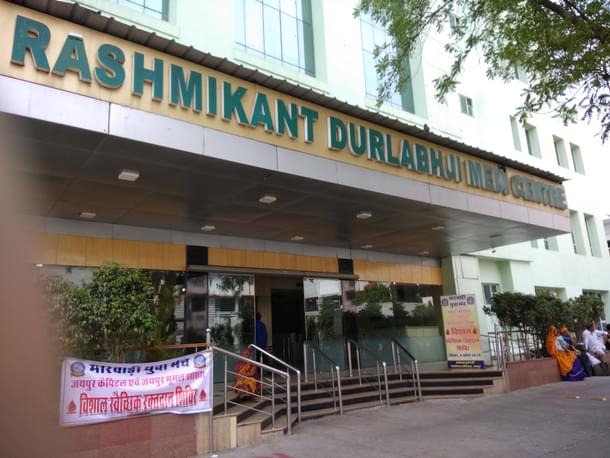
Santokba Durlabhji Memorial Hospital (SDMH) attends to patients under BSBY in four departments – cancer, cardiology, urology and plastic surgery. What led to the link up? SDMH medical director Dr G N Gupta said, "the department heads gave their consent to apply for BSBY and we applied for that. It is a good scheme and is doing well. The poor are benefiting from this scheme. We have a huge inflow of patients, but have accepted patients covered by BSBY."
According to Dr Gupta, process relating to payments to private hospitals for the medical care they provide to patients under BSBY, demands some streamlining. He added, "when a patient approaches us under BSBY, there is no difference between him and others. I want this scheme to work well so that the poorest of the poor can get the best of the treatment."
What are the problems that hamper the flow? "I had to actually employ four people just to clear my bills of BSBY. You have to invest more to get less. And that's the biggest thing. I don't differentiate between any patient. I give them equal services, but the process needs streamlining, if they really want the care in private hospital with the Bhamashah Card. They have to simplify the billing process, have to address it fast. They have to see that we don't have to employ more people to get the things done at our end. It is like throwing the ball again and again into our court," Dr Gupta said.
SDMH’s Dr Kalla explains the process behind handling patients approaching the hospital through BSBY. He said, "BSBY is a good programme but the admission process has to be simplified. The whole process takes two to three days."
Are people opting to seek medical care at private hospitals under BSBY getting more benefit? Dr Agarwal feels they are. "At private hospitals, everything was chargeable earlier. But now, if someone has to get a surgery for renal stone done, he gets everything for free. But BSBY is not giving additional advantages at government hospitals," he said, and added, "earlier, the hospital would not get anything. Now, when the patient is admitted under a package, the government is paying the hospital. In private hospitals, everything had a cost earlier, and is free now. Whereas, in government hospitals, everything was free even earlier. Yet, there is a lack of additional advantage".
What could these additional advantages be? "There should be a separate medicine counter for people falling under Bhamashah Swasthya Bima Yojana. Earlier, it used to happen for below poverty line (BPL) people getting admitted to the hospital. The hospital used to provide medicines that are not available in its free supply, free of cost to the BPL patients at a separate counter. It happens at SMS Hospital now. Drugs indent hokar ek din ki supply aa jati hai," he added.
Why would the need arise for a separate counter for people falling under BSBY? "Suppose I prescribe an antibiotic to a patient admitted to this hospital, and that antibiotic is not available in the free supply (even if it is in the list, is required, and is not still part of the free supply). What option does the patient have?" said Dr Agarwal.
What option would doctors have in such a scenario? "We do not ask him to bring the required medicine from outside because it would become an issue. In this case, the patient would not get the medicine he requires. We have to go with the medicine available at the hospital or ask them to go to SMS Hospital, Jaipur. A separate counter for medicines under BSBY at government-run hospitals would help," he added.
Another hurdle, according to experienced workers at government hospitals engaged in communication with patients falling under BSBY is the understanding and perception of packages included in the scheme, which are listed with the package type, its rate, specialty and code. The system under the yojana requires the hospital and patients to go by a stringent criteria. According to them, it sometimes leads to confusion. These packages are secondary and tertiary (more specialised and advanced).
Dr Agarwal feels that the scheme, launched with the noble intention of providing good healthcare to people who cannot afford medical care, surgeries and treatment, needs improvement. His suggestions are:
One, free drug counters for Bhamashah Card holders.
Two, operation theatre (OT) equipment and other requirements for OT should be made available at this free drug counter for BSBY patients. "Government is paying. Why shouldn't the hospital use the money it has?" he said.
Three, at private hospitals, for people admitted under BSBY, their supervision should be done by a doctor in the BSBY team. This would also ensure that the admission of patient is done under the right package (falling under secondary or tertiary package).
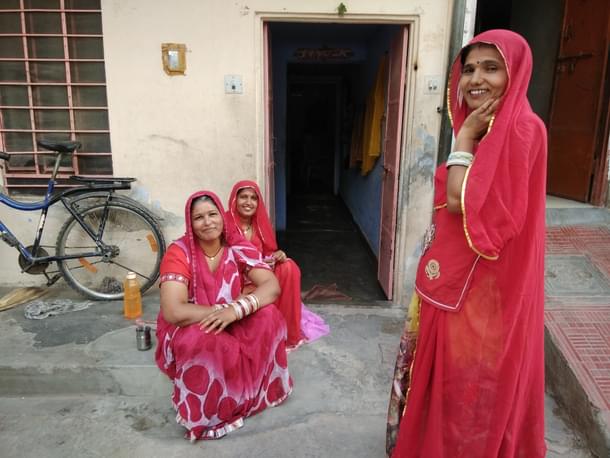
Four, at private hospitals, packages should be applied properly and a proper payment given to the hospital per patient.
Five, better communication between doctors, insurers and the government.
Dialogue, Please
Bhamashah should survive, but with some changes. Dr Omrendra Ratnu, who runs an ENT clinic of his own in Jaipur, feels that changes should come, but after a dialogue. He said, "we should have a dialogue between the service provider, doctors, insurance company with the government acting as a mediator. And we should arrive at a price structure, which is profitable to the hospital and affordable to the insurance company. Once we do that, we will be actually providing an incentive to the medical fraternity to work effectively. The idea of a public mass scale insurance is great, it should be done, no doubt, but after a thorough deliberation between the medical fraternity, the insurance provider and the government."
It is back to the alphabet in the scorching heat at Bikaner stand, Ringas, on National Highway 11. Ringas is situated between Sikar and Jaipur, its longer arm, connecting it to opportunities, healthcare, education, business and facilities in Jaipur, and education and coaching centres – of Sikar. Two women studying under a nursery teachers' training programme, present a good case for BSBY at a local shop, where they have stopped for a quick bite. According to these women, people in Ringas, mostly, prefer travelling to Jaipur for medical care for serious ailments and surgeries. Why is BSBY a good scheme?
One of them said, "you have to understand that it is a facility specific to Rajasthan. It is not available in other states, even in Delhi, where so many poor people live and would do well with such a facility. Have you seen anyone using Bhamashah in Delhi?"
Her friend elaborates while digging into a bowl of hot karhi (a traditional dish made of butter milk). She said, "if you understand medical insurance, you will understand Bhamashah Swasthya Bima Yojana. My aunt had to undergo a surgery for a problem in her ear. We took her to Jaipur for the surgery. Bhamashah Card took care of the expenses. It was easy. She is well now. For people like us, BSBY under Bhamashah Card is a great support".
The field is open for better communication on BSBY and improvement in the yojana, which is aimed at harmonising public and private sectors in the area of healthcare.
A stronger BSBY would be a success story that belongs to the people of Rajasthan.
Sumati Mehrishi is Senior Editor, Swarajya. She tweets at @sumati_mehrishi





